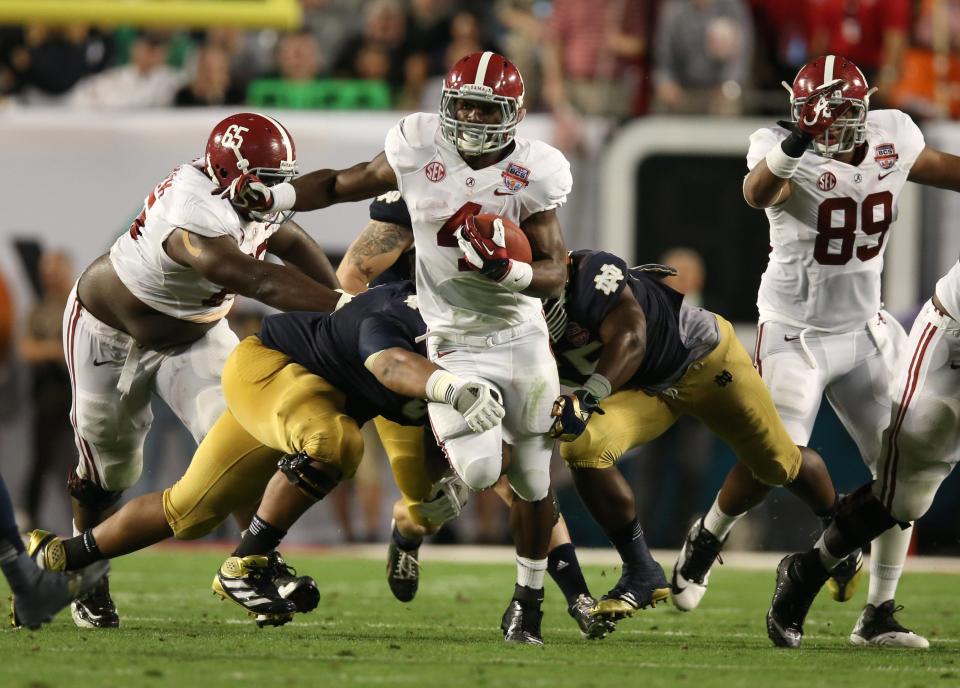The eight schools that have repeated as college football national champions
Just how hard is it to do what Georgia will attempt to accomplish on Monday night, namely repeat as national champion at college football’s highest level?
The short answer is that it would be quite significant. It hasn’t been done in the brief four-team playoff era that spans nine seasons. Alabama owns three titles in that period but none of those were in consecutive seasons.
The longer answer is a bit more complicated, as is everything in this sport which struggled for over a century just to get a framework in place for crowning an undisputed national champ.
But even before the modern realities of transfers, huge conference television contracts and the constant spin of the coaching carousel, repeating wasn’t easy. The multitude of rating methods and whether bowl games actually counted or were just exhibitions were also contributing factors. Indeed, the idea of naming a national champion at all was mostly an afterthought in the sport’s fledgling years. That hasn’t stopped numerous analysts from retroactively calculating rankings and naming top teams ex post facto.
For this exercise, however, we’ll stick to the era of the major polls. Even that will lead to some disputes, of course, as the media and coaches polls disagreed on the final top-rated team on numerous occasions. Post-bowl polls weren’t conducted until the latter half of the 20th century, and even then the Bowl Coalition/Bowl Alliance/Bowl Championship Series didn’t always produce a unified champion. Some repeat winners on this list are therefore still somewhat controversial.
So with all that out of the way, here are the schools claiming back-to-back No. 1 finishes in what is now known as the Football Bowl Subdivision.
Alabama
As mentioned, repeating hasn’t happened for Alabama since the four-team playoff format was adopted in 2014, but the Crimson Tide have achieved the feat three times. The Crimson Tide are the most recent repeat titlists as BCS champs in 2011 and 2012. Alabama was also voted No. 1 by both polls in 1964 and the AP in 1965, but Michigan State was chosen as coaches poll champ in the latter year. It shared the 1978 title with Southern California and was the consensus champion in 1979.

Oklahoma
The Sooners went back-to-back on two occasions. The most recent was in 1974 and 1975, though the first of those championships were split with coaches poll champ Southern California because they were not eligible in that poll due to NCAA probation that kept them off television and out of the postseason. Oklahoma also claimed consecutive crowns after 1955 and 1956 seasons that were part of the school's NCAA record 47-game winning streak. A bid for a three-peat ended the following season with a shocking loss to Notre Dame.
BIG CHANGE: Smart embraced offense, and Georgia is better because of it
LEVEL FIELD: Transfer portal played big role in TCU reaching title game
WHO WINS?: Six keys to victory when Georgia and TCU clash for title
Nebraska
The Cornhuskers are the only other school to have repeated more than once. Under coach Tom Osborne, they were the toast of the college football world in the mid-‘90’s, earning back-to-back titles in 1994 and 1995 with quarterback Tommie Frazier running their dominating offense. The Cornhuskers also had repeat No. 1 finishes in 1970 and 1971, though the first of those was split with Texas, which was the No. 1 finisher in the coaches poll.
Southern California
Here’s where things get complicated. The Trojans can claim AP national champs for 2003 and 2004, though both those seasons come with asterisks. Despite topping both major polls at the conclusion of the 2003 regular season, USC was shut out of the BCS title game thanks to computer formulas that instead paired LSU and Oklahoma in the Sugar Bowl. Voters in the coaches poll were obligated to vote LSU No. 1 after its 21-14 victory against the Sooners, but AP panelists were under no such restriction and kept the Trojans No. 1 after their Rose Bowl win against Michigan. USC claimed the BCS crown the following year, though that result was later vacated and the coaches’ trophy returned.
Texas
The 1969 season concluded with the Longhorns being famously declared national champions by President Nixon following their epic victory against Arkansas. The pollsters agreed as the Longhorns went on to beat Notre Dame in the Cotton Bowl. The coaches voted Texas No. 1 again the next year, though the AP panel selected Nebraska.
Notre Dame
The Fighting Irish boast eight first-place finishes in the poll era, but only once did they manage it in back-to-back seasons in 1946 and 1947, led by legendary quarterback Johnny Lujack, who won the Heisman Trophy in the second of those championship campaigns.
Army
With the nation’s energies largely devoted to the war effort, West Point was the center of the football world. Army closed out 1944 and 1945 with decisive wins against academy rival Navy for the school’s only No. 1 finishes among the major polls.
Minnesota
The Golden Gophers were the first repeat champs of the major poll age, topping the final rankings in 1940 and 1941 led by Heisman winner Bruce Smith.
This article originally appeared on USA TODAY: College football repeat national champions include just eight programs

